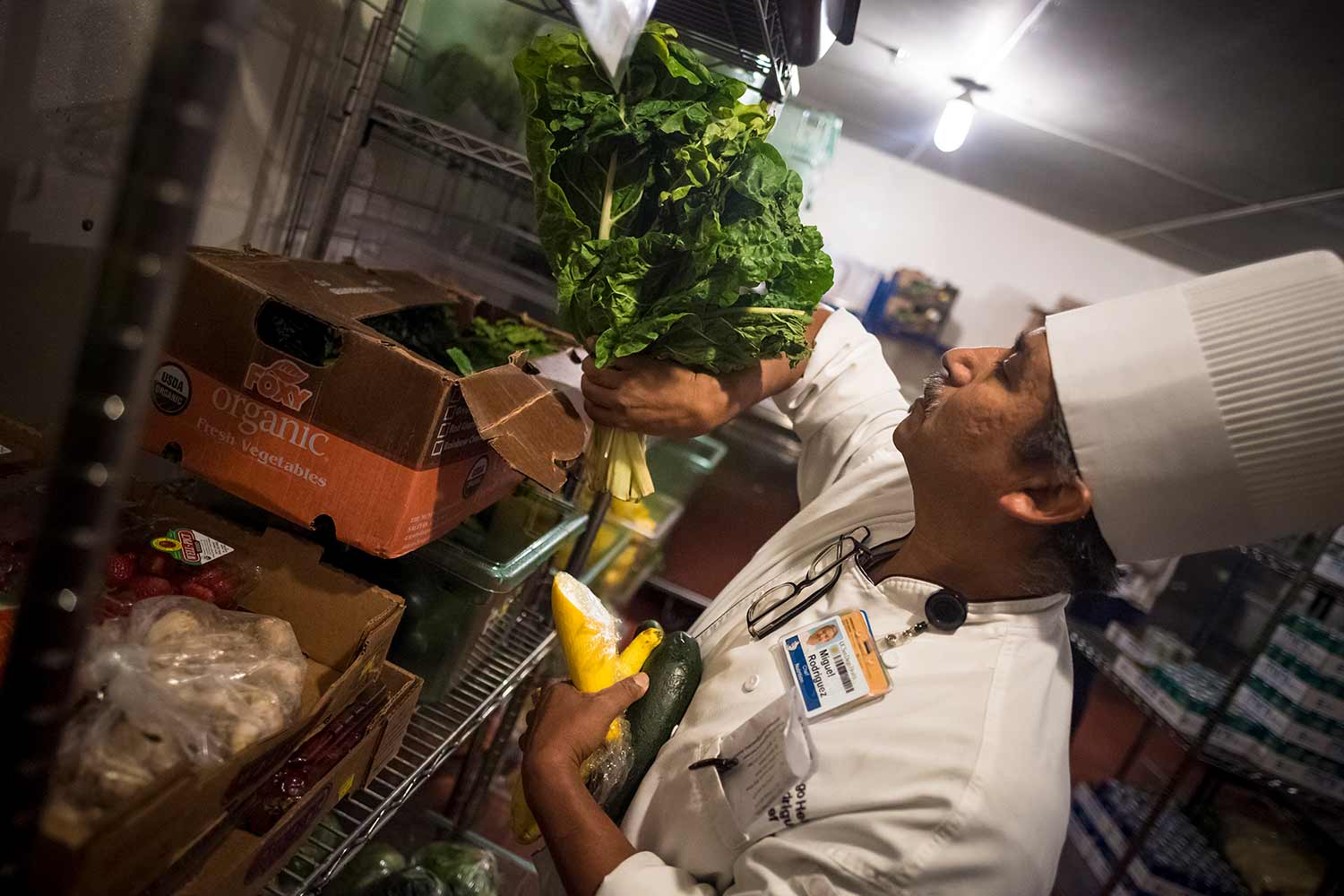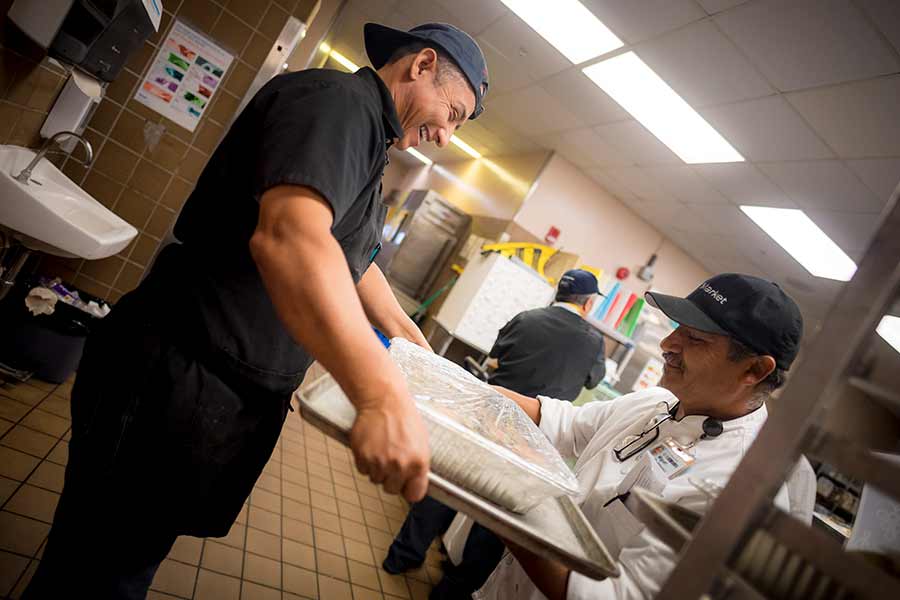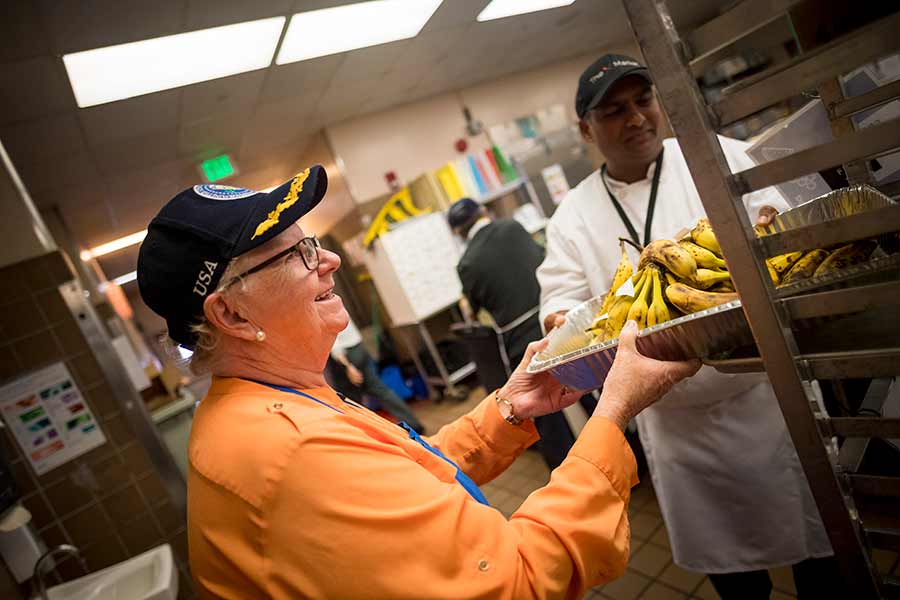4,425
pounds of food donated equals 4,460 meals provided
By:
Published Date
By:
Share This:

Sous Chef Miguel Rodriguez leads a team at UC San Diego Medical Center in Hillcrest that prepares nutritious meals for patients, visitors and employees. He’s also responsible for reducing food waste and selecting fresh produce and leftover meals that are donated to the Smart Kitchens San Diego program. Photos by Erik Jepsen/UC San Diego Publications
Think back to your childhood days when mom whipped up a steaming pot of her delicious chicken soup. On a fall or winter day, as the smell filled the room, your taste buds started dancing even before you reached for a spoonful. Would you still be excited if she served it on a sweltering summer day?
Michael Harrison, UC San Diego Health–La Jolla sous chef, would likely say, ‘No.’ Thanks to a new tracking program that is helping the university’s medical centers in Hillcrest and La Jolla reduce food waste, Harrison calculated that 21 pounds of soup was left over in his kitchen over the summer.
“There are always leftovers in the kitchen, from scraps as we prepare meals to leftovers from room service to food that isn’t purchased in the café,” said Harrison. “By participating in the ‘Smart Kitchens San Diego’ initiative we are learning to be more efficient by tracking what doesn’t sell, what food is composted, donated and wasted.”
When he saw how much soup was left over this summer, Harrison set a goal to reduce soup waste by 50 percent. This is part of a larger program under the leadership of Chris McCracken R.D., UC San Diego Health director of Nutrition Services, to reduce the health system’s carbon footprint by first reducing waste, and then repurposing or redistributing food that would otherwise end up in the landfill.
Edible leftovers are now repurposed or donated to the UC San Diego student food pantry or Special Delivery San Diego, a nonprofit that provides meals and groceries to 800 families per month.
“I believe food is medicine. Coupled with what we’re preparing, medicine can provide extra healthy years and dignity for very ill people,” said Ruth Henricks, founder and executive director of Special Delivery San Diego. “Soup is a favorite donated food–especially cream of cauliflower–for people who need pureed meals like those with esophageal cancer.”

Rafael Carranza of Special Delivery San Diego accepts trays of leftover food from Blaze Fernades, catering lead at UC San Diego Medical Center, that will be delivered by the nonprofit group to San Diegans facing food insecurity.
In the 1990s, Henricks, a restauranteur, began to see her regulars disappear from her restaurant, too ill to leave their homes. That prompted her to start her nonprofit home delivery program, and later a food pantry.
Henrick’s home delivery program serves up to 20 specialized meals to people undergoing dialysis, breast cancer treatment or who are suffering from end stage liver failure. UC San Diego Health’s food waste reduction program is now supplementing these meals.
Health care, universities and hospitality are some of the largest producers of food waste in San Diego, said Barbara Hamilton, UC San Diego Health sustainability officer. The first goal of the initiative is to understand what UC San Diego Health is wasting to prevent future excess.
“One in five children in San Diego are food insecure,” said Hamilton, who wrote the CalRecycle grant that funds the Smart Kitchens San Diego initiative. “Up to 50 percent of college students sometimes need to choose between paying their bills or buying food. I’m really excited about the future of this program because it has a significant impact on the health of the community and the health system’s bottom line.”
pounds of food donated equals 4,460 meals provided
Both the UC San Diego Health Hillcrest and La Jolla campuses joined the initiative in 2019. In the first six months, Nutrition Services has already seen an average of 46 percent reduction in food waste, diverting 14,412 pounds of food from the landfill and donating 4,425 pounds of food.
Each day, the nutrition team at each campus goes through their food stock. Food is weighed and added to a database with comments that include why it is being “wasted” and whether it will be repurposed, donated or composted. The tracking technology also provides a value for each item, helping the kitchen make important financial decisions about what and how much it purchases.
When the program initiated at UC San Diego Health, the team was seeing 400 pounds of food wasted. They have since cut that in half and are making strides to reduce waste further.
The top wasted food is rice. Potatoes and meats are good candidates for repurposing into soup —although maybe not as often in the summer months. Boxes of spice cakes that did not make the list of favorites for hospital guests found their way to homes thanks to Special Delivery San Diego.

In addition to leftovers, Fernades also provided Ruth Henricks, founder and executive director of Special Delivery San Diego, with fresh produce that will supplement food delivery to hundreds of families in need of healthy meals.
On a recent weekday, the nutrition team was starting to fill a rack with leftovers that included trays of chile rellenos—a Mexican dish made up of stuffed poblano peppers dipped in an egg batter and fried—mozzarella cheese and bread. More would be added as the kitchens close for the day.
“We know how valuable and expensive food is so we’re trying to increase the environmental sustainability of food, from food procurement through food waste reduction and diversion while making a concerted effort to improve healthy food access and decrease hunger where possible,” said Sadie Clements, R.D., assistant director of Nutrition Services, who serves as setup lead for the Smart Kitchens San Diego program at UC San Diego Health. “Our team feels good that someone else can benefit from delicious edible food that would otherwise be wasted.”
Share This:
Keep up with all the latest from UC San Diego. Subscribe to the newsletter today.